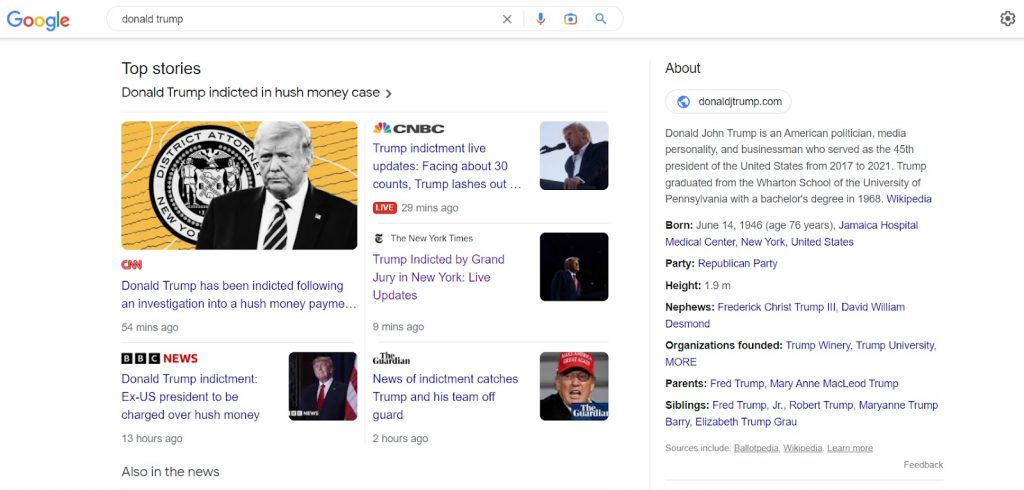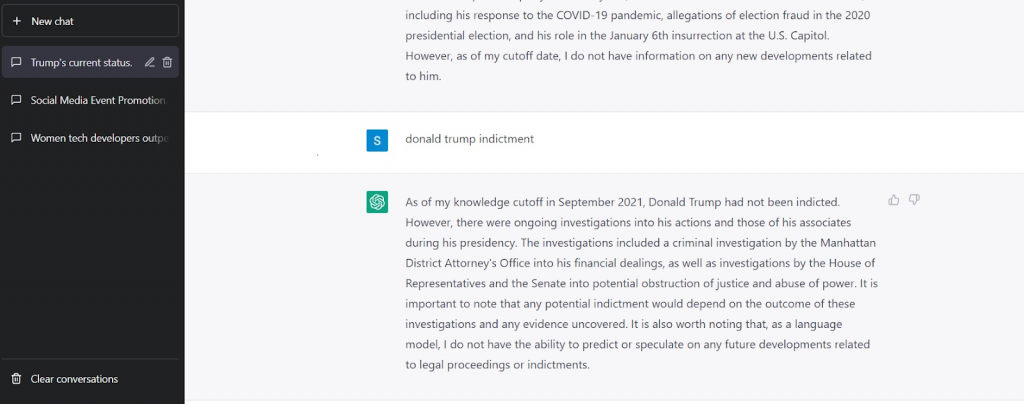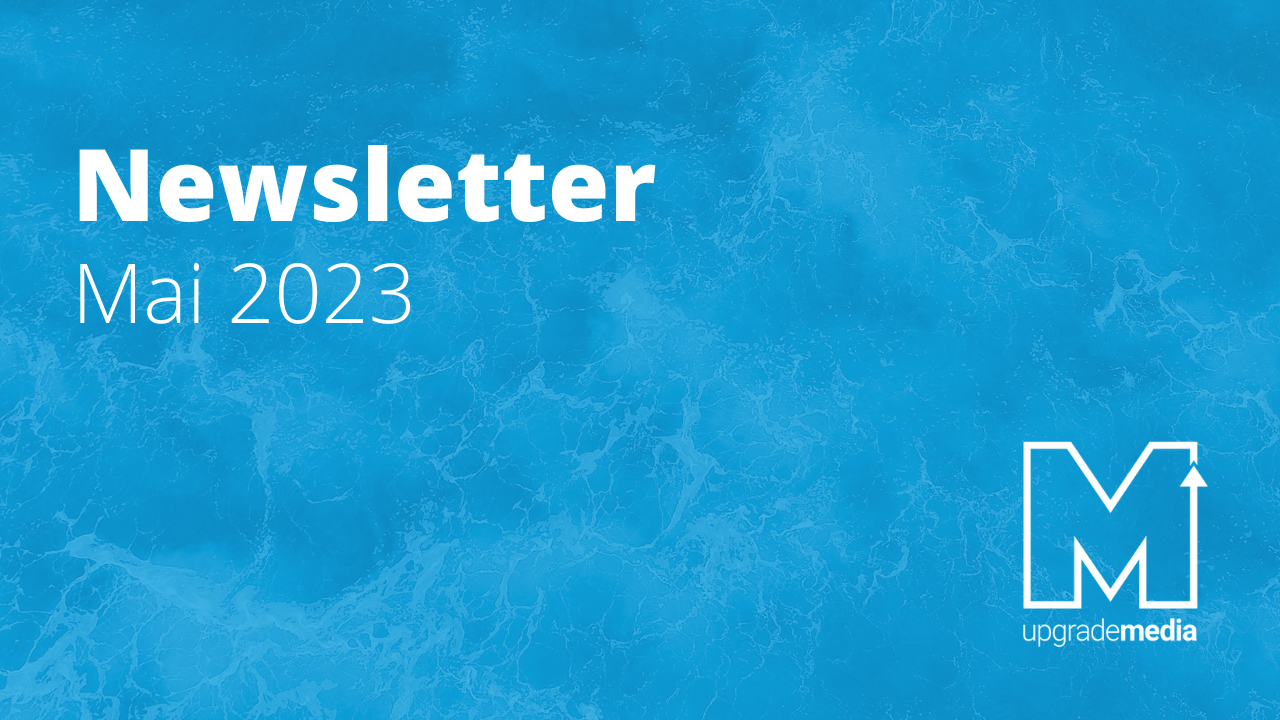With the focus on whether AI is set to replace journalists it is understandable that many journalists in editorial have yet to really engage with what AI is likely to do to search, and with it the way people find news. So let’s start with three images that may give us an idea.
You are reading the Upgrade Media newsletter sent on 25 May 2023. Sign up now to receive future newsletters directly in your inbox or via LinkedIn.
Think back to early April and the day Donald Trump was indicted.
Anyone Googling for the ex-president that day would have seen these results;

The key content being offered consists of Google’s own synopsis of Mr Trump, but only after the lead stories from recognisable news sources including CNN, CNBC, BBC, The New York Times, and The Guardian.
It doesn’t resolve the Google vs News publishers issues about revenue, but at least the news publishers feature front and centre in the results.
In the wake of the recent leaps in AI, however, we have seen developments such as Microsoft incorporating AI into its Bing search engine, and in turn incorporating that into products such as Skype.
If, on that April day, a user had chosen to ask Skype about Mr Trump they would have learned this:

Bing (via Skype) only cites two sources: the BBC, and Yahoo.
Not so great for news publishers.
But if you think that is bad, anyone on that day who relied on the now (in)famous ChatGPT for their worldview would have been told that Mr Trump had not been indicted at all.

Let’s be clear. ChatGPT does not claim to be a new source, and behind the scenes it has strict rules about what are acceptable responses and information.
The point is not that people will suddenly drop search engines for AI, but rather that AI is finding its way into search, and risks changing the rules as it does so.
Search is big business, and a huge driver for news traffic.
With Microsoft incorporating AI into Bing, the traditionally Google-dominated searchscape changed rapidly.
A report that Samsung was looking at replacing Google with Bing as the default search engine across all its Android phones resulted in Alphabet, Google’s parent company, losing 4% off its share price.
Google’s response has been described as ‘panic’ and it has promptly accelerated its own incorporation of AI into search
The danger is that while Google has come a long way in terms of courting the news industry, AI search, at least as we currently understand it, is not only more conversational, but more about giving users a (seemingly) straight answer to their question, rather than offering links to information sources.
AdWeek has boldly stated that companies relying on search traffic can “prepare for a future without it” as well as waving goodbye to affiliate marketing revenues.
The New York Times has pointed out that with many sites getting up to half their traffic from search engines, publishers can expect to see traffic fall in the era of chatbots.
The irony is that much of the content used by LLM AI engines to learn has been taken from news publishers, an irony not lost on News Corp which is demanding payment.
Given how fast the searchscape has changed in just the last few weeks it is mere speculation to predict exactly what happens next for news.
Larger publishers and publishing bodies are already waking up to the need to talk to the tech giants, but the last twenty years have shown that publishers don’t hold the best cards when they sit down with the giants of GAFAM.
Implications for independent publishers
Change is inevitable, however daunting, but there are some interesting angles to the impact of AI on search for smaller, independent publishers.
The news sources most likely to be affected are precisely those carrying the big stories of the day.
Breaking news, international news, celebrity news are the things people are most likely to search for, with less concern for the platform that serves them the answer.
AI replies will take a chunk out of news sources when it comes to simple answers to burning issues. As per our example many will only want to know what is happening to Mr Trump and care little whether it is the BBC, or NYT, Bing, or Bard that tells them.
However niche publishing, hyperlocal news, opinion, and news brands with a strong identity are proportionately less likely to be impacted as long as their public continues to search them out.
Traditional search will probably shrink, and with it the importance of visibility via social media and alternative platforms will increase. Smart independent publishers will focus less on keywords and SEO, and more on driving digital ‘word of mouth’.
The good news, based on the first search revolution, is that as we learn how the new AI search affects news, tips and tricks will emerge as individual publishers find ways of boosting their visibility.
The Upgrade Media team.
About Upgrade Media: Upgrade Media is a creative agency, strategy consultancy, training center and media transformation think tank, through its brand New World Encounters.
◾️ We work for media and communicating companies to accelerate their digital transformations, evolve their organizations, print and digital products, and also develop team agility.
◾️ Check out our Upgrade Media website to learn more about our projects and approach.
◾️ We hope this article and our other content inspires you!
Thank you for reading.
Keep up to date with all our news by subscribing to our Newsletter by e-mail or via Linkedin.
